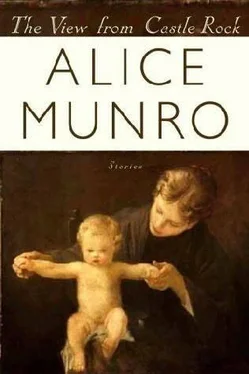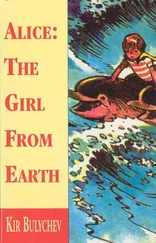To his way of thinking, 1 ought to be longing to scrape the home-dirt off my shoes. Concentrating on the life, the home, that we would make together.
1 did take a couple of hours off some afternoons, but what I did then, if I had written about it, would not have satisfied him much better. 1 would tuck my mother in for her second nap of the day and give the kitchen counters their final wipe and walk from our house on the far edge of town to the main street, where I did a bit of shopping and went to the library to return one book and take out another. 1 had not given up reading, though it seemed that the books 1 read now were not so harsh or demanding as the books I had been reading a year before. 1 read the short stories of A. E. Coppard-one of them had a title I found permanently seductive, though I can’t remember anything else about it. “Dusky Ruth.” And I read a short novel by John Galsworthy, which had a line on the title page that beguiled me.
The apple tree, the singing and the gold…
My business on the main street finished, I went to visit my grandmother and Aunt Charlie. Sometimes-most times-I would rather have walked around alone, but I felt I could not neglect them, when they were doing so much to help me. I could not walk around here in a reverie, anyway, as I could have done in the city where I went to college. In those days nobody in town went for walks, except for some proprietary old men who strode around observing and criticizing any municipal projects. People were sure to spot you if you were noticed in a part of town where you had no particular reason to be. Then somebody would say, we seen you the other day -and you were supposed to explain.
And yet the town was enticing to me, it was dreamy in these autumn days. It was spellbound, with a melancholy light on the gray or yellow brick walls, and a peculiar stillness, now that the birds had flown south and the reaping machines in the country round about were silent. One day as I walked up the hill on Christena Street, towards my grandmother’s house, I heard some lines in my head, the beginning of a story.
All over the town the leaves fell. Softly, silently the yellow leaves fell - it was autumn.
And I actually did write a story, then or sometime later, beginning with these sentences-I can’t remember what it was about. Except that somebody pointed out that naturally it was autumn, and that it was foolish and self-consciously poetic to say so. Why else would the leaves be falling, unless the trees in the town had developed some sort of leaf plague?
My grandmother had a horse named after her, when she was young. This was meant to be an honor. The horse’s name, and my grandmother’s name, was Selina. The horse-a mare, naturally-was said to be a high stepper, which meant that she was lively, energetic, and apt to prance about in her own style. So my grandmother herself must have been a high stepper. There were a lot of dances then in which this tendency could be displayed-square dances, polkas, schottisches. And my grandmother was a noticeable young woman anyway-she was tall, busty, slim-waisted, with long strong legs and dark-red, wildly curly hair. And that audacious patch of sky blue in one of the irises of her hazel eyes.
All these things would add up, and be added to, by something in her personality, and surely that was what the man would be trying to comment on, when he paid her the compliment of giving her name to his mare.
This man was not the one who was believed to be in love with her (and whom she was believed to be in love with). Just an admiring neighbor.
The man she was in love with was not the man she married, either. He was not my grandfather. But he was someone she knew all her life, and in fact I met him once. Maybe more than once, when I was a child, but once that I can remember.
It was when I was staying with my grandmother, in her house in Downey. And it was after she became a widow but before Aunt Charlie became one too. When they had both become widows they moved together to the town outside which we lived.
Usually it was summer when I stayed in Downey, but this was on a wintry day, with a light snow falling. Early winter, because there was hardly any snow on the ground. I would have been five or six years old. My parents must have left me there for the day. Perhaps they had to go to a funeral, or take my little sister, who was frail and mildly diabetic, to see a city doctor.
In the afternoon we walked across the road, to enter the grounds of the house where Henrietta Sharpies lived. It was the largest house I had ever been in and its property ran right from one street to another. I looked forward to going there, because I was allowed to run free and look at anything I liked, and Henrietta always kept a bowl full of toffees wrapped in glistening red or green or gold or violet paper. As far as Henrietta was concerned I could have eaten all of them, but my grandmother kept an eye on me and fixed a limit.
Today we made a detour. Instead of going to Henriettas back door we turned towards a cottage on her grounds, to the side of her house. The woman who opened the door had a puff of white hair, glowing pink skin, and a great breadth of stomach, swathed in the sort of bib apron most women wore then, indoors. I was told to call her Aunt Mabel. We sat in her kitchen, which was very hot, but we did not take off our coats because it was to be just a short call. My grandmother had brought something in a bowl under a napkin which she gave to Aunt Mabel-it might have been fresh muffins, or tea biscuits, or some warm applesauce. And the fact that we had brought it did not mean that Aunt Mabel needed any special charity. If a woman had been baking or cooking she often took an offering along when she went to her neighbor’s house. Very likely Aunt Mabel protested against such generosity, as was the custom, and then, accepting, made a great fuss about how good it smelled and how good whatever it was would taste.
Then she probably got busy offering something of her own, insisting on at least making a cup of tea, and I seem to hear my grandmother saying no, no, we had just dropped in for a moment. She could have explained further that we were on our way to the Sharpies house. Perhaps she wouldn’t say the name, or that we were going for a proper visit. She might just say that we couldn’t stop, we were going to drop in across the way. As if we were on a series of errands. She always spoke of going to visit Henrietta as going across the way, so that she would never seem to be flaunting the friendship. Never bragging.
There was a noise in the woodshed attached to the cottage, and then a man came in, flushed from the cold or exercise, and said hello to my grandmother and shook hands with me. I hated the way old men might greet me with a poke in the stomach or a tickle under the arms, but this handshake seemed cordial and proper.
That was all I really noticed about him, except that he was tall and not large around the stomach like Aunt Mabel, though like her he had thick white hair. His name was Uncle Leo. His hand was cold, probably from splitting wood for Henriettas fireplaces, or putting bags around her bushes to protect them from the frost.
It was later, though, that I learned about his doing such chores for Henrietta. He did her outdoor winter work-shovelling snow and knocking down icicles and keeping up the wood supply. And trimming the hedges and cutting the grass in the summer. In return he and Aunt Mabel had the cottage rent-free, and maybe he was paid something as well. He did this for a couple of years, until he died. He died of pneumonia, or a failure of the heart, the sort of thing you expected people of his age to die of.
I was told to call him Uncle, just as I had been told to call his wife Aunt, and I didn’t question this or wonder how they were related to me. It wasn’t the first time I had taken on board an aunt or an uncle who was mysterious and marginal.
Читать дальше












